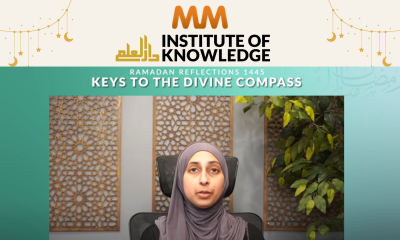#Society
Be A Caller Not A Judge
Published

I am sure the readers will have come across numerous notices at some mosques discouraging certain types of people attending the mosques. Here is an example of many I have had the displeasure of reading:
‘We will not assist in counselling unless you are Islamically and decently dressed’.
I am not sure whether the advocates of this notice really understand the purpose of counselling or what the role of the imam should be in the community.
Keep supporting MuslimMatters for the sake of Allah
Alhamdulillah, we're at over 850 supporters. Help us get to 900 supporters this month. All it takes is a small gift from a reader like you to keep us going, for just $2 / month.
The Prophet (SAW) has taught us the best of deeds are those that done consistently, even if they are small. Click here to support MuslimMatters with a monthly donation of $2 per month. Set it and collect blessings from Allah (swt) for the khayr you're supporting without thinking about it.
To discourage people from seeking help because they may not be ‘appropriately’ dressed in one’s eyes defeats the very purpose of counselling. It takes enormous courage and bravery to seek help and to read these dogmatic and crude attitudes is very disheartening. The job of an Imam/counsellor is not to judge but enable people to explore their concerns and worries.
Counselling is not about preaching to people. It is not about changing people the way you may want others to be. It is certainly not about imposing your understanding onto others. It is not about judging others by how your own worldview is. A counsellor is not there to sit you down and tell you what to do – instead they will encourage you to talk about what’s bothering you in order to uncover any root causes and identify your specific ways of thinking. The counsellor may then look to create a plan of action to either help you reconcile your issues or help you to find ways of coping. A lot of the time those who seek help simply want to be heard and listened to and the counsellor will facilitate that.
One of the impediments of being an effective Imam counsellor is the lack of awareness of other people’s states and conditions as well as the lack of appreciation of the multi natured or the diversity of approaches and intellectual foundations people are exposed to. In order to be effective helpers and practitioners in the community, Imams/counsellors should take into consideration what may be termed as the ‘Diversity- and relationship – oriented empathy’ attitude towards the members of the society.
What is empathy?
Different theoreticians and researchers have defined it in different ways. Some see it as a personality trait, a disposition to feel what other people feel or to understand others ‘’from the inside’’, as it were. Others see empathy, not as a personality trait, but as a situation-specific state of feeling for understanding of another person’s experiences. Covey (1989), naming emphatic communication one of the ‘’seven habits of highly effective people,’’ said that empathy provides those with whom we are interacting with ‘’psychological air’’ that helps them breathe more freely in their associations and connections. Finally, Goleman (1995, 1998) puts empathy at the heart of emotional intelligence.
It is the individual’s ‘’social radar’’ through which he or she senses others’ feelings and perspectives and takes an active interest in their concerns. These and other academics, although they provide us with different definitions, nevertheless, their language is lyrical in giving us the maqsad (spirit) of what empathy denotes. It is a natural trait (jibillat) which also can be acquired through learning and understanding one’s own condition and experiences of others.
The Prophet 
Below are some examples:
- Anas Ibn Malik narrated that “the Prophet
used to mix with us (the children) to the extent that he would say to a younger brother of mine, ‘O Abu-‘Umayr! What did the Nughayr (a kind of bird) do?’ “(Bukhari). This demonstrated to the children that they were valued. This was the Messenger of Allah, who was a leader of thousands, a husband, father – despite these and other heavy duties and obligations, he had time to play with the children. This made them feel that they are loved, cared for and appreciated.
- Whenever he would enter Medinah he would carry his grandchildren and other children nearby on his mount. Again, given them the important attention children need.
- In another well-known tradition, a young companion related that he spent many years with the Prophet and not once did he complain or rebuke him.
- He would carry his granddaughter Umamah on his shoulders even while he was praying. Some narrations mention that he hastened to complete the prayer because of them. These and other examples show the great teacher and counsellor the Prophet was (peace be upon him).
Learning, inculcating and teaching empathy may solve many of the problems we face in our society.
The WAVE Trust, an international charity dedicated to raising public awareness of the root causes of violence in the society and the ways to reduce it, commissioned research that came up with some amazing findings: ‘’Empathy is the single greatest inhibitor of the development of propensity to violence. Empathy fails to develop when parents or prime carers fail to attune with their infants’’ (Hosking & Walsh, 2005, p.20). To attune to a child means ‘’attempting to respond to his or her needs, particularly emotionally, resulting in the child’s sense of being understood, cared for, and valued’’. (p. 20)
In many instances, it is argued that those who carry out acts of violence or cruel behaviour in the society have had issues and problems at their early life which were not dealt with but suppressed, and in their later stage of their life some external agent (s) or incident triggers some of the feelings and they lash out expressing their inner turmoil which results in cruel and sometimes inhumane behaviour.
As stated above it is of paramount importance for Imam counsellors to understand that the people they serve originate from diverse backgrounds. People will differ in ability, age, economic status, education, ethnicity, group culture, national origin, occupation, personal culture, politics, religion – to name a few. It is from the prophetic methodology to incorporate these variables and factors in one’s dealings with people. Below are some examples from the sunnah to illustrate some of the approaches being discussed:
- While the prophet was once returning to his house after talking to his companions in the mosque, a Bedouin pulled him by the collar and said rudely: ‘O Muhammad! Give me my due! Load up these two camels of mine. For you will load them up with neither your own wealth nor the wealth of your father.’ To this impertinence the prophet responded without expressing any sign of offence: Give that man what he wants! (Abu Dawud). The Prophet understood the nature, cultural difference, economic status, and psychological state of the Bedouin and did not resort to rebuke him for his rudeness and disrespect towards him.
- Zayd ibn San’an narrates: Once, Allah’s Messenger borrowed some money from me. I was not yet Muslim then. I went to him to collect my debt before its due time, and insulted him, saying; ‘You the children of ‘Abd al-Muttalib, are very reluctant to pay your debts!’ ‘Umar became very angry with this insult of mine and shouted; ‘O enemy of Allah! Were it not for the treaty between us and the Jewish community, I would cut off your head! Speak to Allah’s Messenger politely!’ However, Allah’s Messenger smiled at me and, turning to Umar, said; ‘Umar, pay the man his debt! And add to it the amount of twenty gallons because you have frightened him!’ Umar relates the rest of the story: ‘We went together. On the way, Zayd spoke to me unexpectedly; O Umar! You got angry with me. But I have found in him all the features of the Last Prophet recorded in the Torah, the Old Testament. However, there is this verse in it: ‘His mildness surpasses his anger. The severity of impudence to him increases him only in mildness and forbearance.’ In order to test his forbearance, I uttered what I uttered. Now I am convinced that he is the Prophet whose coming the Torah predicted, so, I believe and bear witness that he is the Last Prophet.’ (Suyuti, al-Khasais). The mildness and empathy of Allah’s Messenger sufficed for the conversion of Zayd, who was on another religion and culture.
- Even in the realm of worship, the Prophet was diligent and understood the different abilities and circumstances of the people. When a complaint was circulated about an imam because he prolonged the prayer, the Prophet climbed the pulpit and said: O you people! You cause aversion in people from prayer. Whoever among you leads a prescribed prayer should not prolong it, for there are among you people who are sick or old or who are in urgent need.’ (Bukhari). He even reproached his beloved companion, Muadh ibn Jabal when he prolonged the night prayer, saying, ‘Are you a trouble-maker? Are you a trouble-maker? Are you a trouble-maker? (Muslim)
- The Prophet
said, ‘No Arab is superior over a non-Arab, and no white is superior over black (Ahmad), and superiority is by righteousness and God-fearing alone (Sura Hujurat, 49, 13). He also declared that even if an Abyssinian Black Muslim were to rule over Muslims, he should be obeyed. (Muslim). During the time of the Messenger of Allah, the same kind of racism we encounter today, under the name of tribalism, was prevalent in Makkah. He understood the biases and prejudice people had and eradicated it from the outset.
These are few examples out of many where the Prophet showed and articulated diverse and multicultural competencies. The more Imam counsellors understand the broad characteristics, needs, and behaviours of the people they serve, the better positioned they will be to demonstrate the true compassionate nature of Islam.
Below is a basic list of competencies adapted from different books, articles and experiences of individuals:
- Beware of your own personal culture, including your cultural heritage, and how you might come across to people who differ from you culturally and in a host of other ways.
- Beware of the personal-cultural biases you may have toward individuals and groups other than your own.
- As an Imam/counsellor, be aware of both ways in which you are like any given individual you are helping and ways in which you differ. Both can aid or stand in the way of the support process.
- Come to understand the values, beliefs, and worldviews of groups and individuals you will encounter. In other words, to feel what other people feel or to understand others ‘’from the inside’’, as indicated above.
- Come to understand how all kinds of diversity, group, cultural, ethical or otherwise, contribute to each person’s dynamic make up.
- Be aware of how socio-political influences such as poverty, oppression, stereotyping, discrimination, prejudice, and marginalisation might have affected people with whom you encounter or with those you are trying to have a dialogue.
- Establish rapport with and convey empathy to people. Both in the individual and collective capacity.
- Initiate and explore issues of difference between yourself and the people you are working with. Always bearing in mind that Islam does not place any barriers between people. In the end your interactions (and the barriers between us and them) with people are personal.
- Design non bias strategies and plans for people that factor in the diversity, education and upbringing they received.
- Finally, asses your own level of competence and strive to improve in all areas outlined above.
To conclude, our approach should be about working with people the way they are, both Muslims and non-Muslims alike, however, it does not imply that you need to apologise for who you are.
Written in 2009, posted with minor modifications.
Keep supporting MuslimMatters for the sake of Allah
Alhamdulillah, we're at over 850 supporters. Help us get to 900 supporters this month. All it takes is a small gift from a reader like you to keep us going, for just $2 / month.
The Prophet (SAW) has taught us the best of deeds are those that done consistently, even if they are small. Click here to support MuslimMatters with a monthly donation of $2 per month. Set it and collect blessings from Allah (swt) for the khayr you're supporting without thinking about it.
Sh. Abdullah Hasan holds an Imam Diploma, BA, and Ijaza Aliyah in Islamic Studies from a European seminary. Disciplines include fiqh, usul al-fiqh, Ifta, and other traditional subjects. He also has a diploma in Arabic from Zarqa Private University and studied at the college of fiqh wa usuluhu at the same university, receiving private training from renowned Scholars in Jordan and the Middle East. With a background in counselling and psychology, he has provided therapy for individuals, couples, and families for over a decade. He holds certificates and diplomas in person-centred psychotherapy, marriage and youth counselling, and SFBT psychotherapy. Sh. A. Hasan is currently pursuing a doctorate in applied psychology after completing a Master's degree in the same field, and also Masters Programme in Medical Psychology. His expertise also extends to Zakat and Islamic philanthropic studies. Having served as an Imam in various UK Muslim communities, Sh. A. Hasan is deeply committed to community and people development. He brings over 10 years of experience in management, leadership, and training within the third sector. Currently, he serves as a teacher of Islamic psychology and counselling, a Consultant Counselling Psychologist at Gift Foundation. Additionally, he provides Chaplaincy counselling from multiple mosques in London, UK. Sh. A. Hasan is the founder of significant initiatives such as Imams Against Domestic Abuse (IADA), the British Imams, Scholars Contributions and Achievements (BISCA Awards), and the British Institutes, Mosques, and Associations (BIMA Awards). He is a member of The Association of Islamic Mental-Health Specialists (AIMS) and actively contributes to numerous other community organisations and projects, nationally and globally.


Israel Seeks Escalation For Latitude – The Regional “Conflict” Widens

Post-Ramadan Reflections From A Mother Of Littles

[Podcast] Palestine in Our Hearts: Eid al-Fitr 1445 AH

Foreign Affairs Official Resigns Over Gaza Genocide

A Ramadan Quran Journal: A MuslimMatters Series – [Juz 30] Solace For The Sincere And Vulnerable

IOK Ramadan: 7 Qualities of Highly Effective Believers | Keys To The Divine Compass [Ep18]

IOK Ramadan: Choose Wisely | Keys To The Divine Compass [Ep15]

IOK Ramadan: Making Time for Allāh at Night | Keys To The Divine Compass [Ep21]

IOK Ramadan: They Were Not Created Without Purpose | Keys To The Divine Compass [Ep23]

IOK Ramadan: Appreciating the Prophet ﷺ | Keys To The Divine Compass [Ep22]

IOK Ramadan: The Importance of Spiritual Purification | Keys To The Divine Compass [Ep30]

IOK Ramadan: The Power of Prayer | Keys To The Divine Compass [Ep29]

IOK Ramadan: The Weight of the Qur’an | Keys To The Divine Compass [Ep28]

IOK Ramadan: Families of Faith | Keys To The Divine Compass [Ep27]

IOK Ramadan: Humility in Front of the Messenger | Keys To The Divine Compass [Ep26]
Trending
-
#Islam3 weeks ago
IOK Ramadan: 7 Qualities of Highly Effective Believers | Keys To The Divine Compass [Ep18]
-
#Islam3 weeks ago
IOK Ramadan: Choose Wisely | Keys To The Divine Compass [Ep15]
-
#Islam3 weeks ago
IOK Ramadan: Making Time for Allāh at Night | Keys To The Divine Compass [Ep21]
-
#Islam3 weeks ago
IOK Ramadan: Appreciating the Prophet ﷺ | Keys To The Divine Compass [Ep22]



